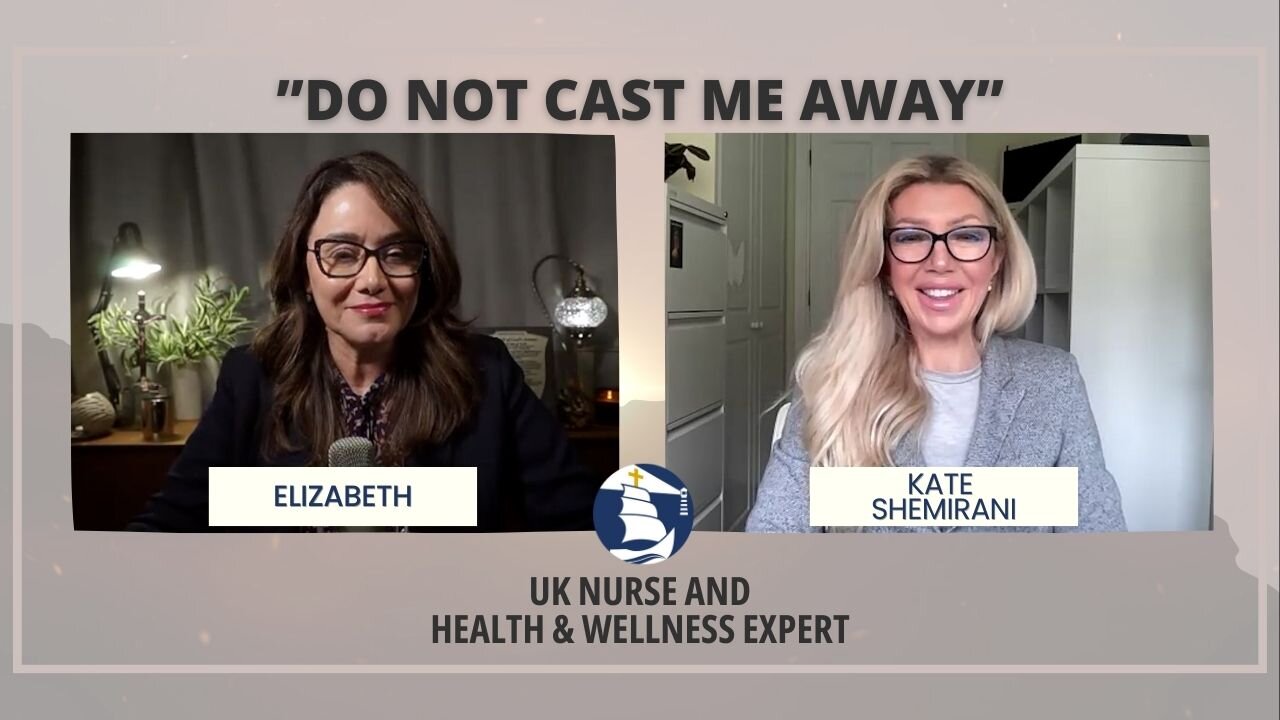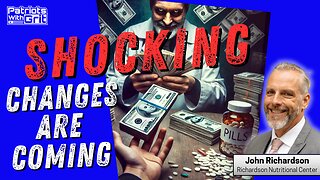Premium Only Content

"Do not cast me away" - An interview with Kate Shemirani
Kate Shemirani is a UK nurse with 36 years of experience in nursing. She is also a personal nutritionist, a health and wellness expert and a mum.
In 2012,she was diagnosed with breast cancer. Whilst following her chosen natural treatments, she began to extensively study nutrition and the effect it could have, both positive or negative on disease and healing. This was to become her passion.
Kate spoke out on her local radio show in March 2020, regarding covid19 and other health issues, which became viral and the rest is history.
Even the Daily Mail , back in 2020, asked is this the most dangerous woman in Britain?.
Kate now presents on several radio shows, is a public speaker and consults patients privately on how to ‘avoid and reverse disease naturally’.
In this episode we discuss the following:
- In our first interview, 2 years ago, we discussed Kate’s cancer diagnosis. A lot has happened since then in the cancer space. We are seeing a rise in what is now being called turbo cancers amongst those who have taken the covid injections. But also, many doctors are now starting to discuss alternatives to chemotherapy and immunotherapy drugs. Kate tells us her thoughts on what’s going on wrto cancer treatment, and tells us about her breast cancer journey and success with her treatment and health.
- We discuss organ donation. We discuss the video of Dr Paul Byrne, an American doctor, talking about what happens in the ER during organ donation. Specifically about how organs are not taken from dead people, the patient is alive, and in fact an anaethetist has to paralyse the patient.
- The organs are taken while the donor is alive. "They give paralyzing agents when they take the organs, so that they don't move or squirm. Their heart rate goes up and their pressure goes up, which is the response to pain, but they can't demonstrate that they have pain."
- So they take the organs and then they switch the ventilator off.
- The optimum age for organ donation is under 30 years of age.
- What is brain death? What is the test? It is not standardised across the world and in fact, UK has the worst standards. Kate explains the tests are pantomime, theatre, it is eugenics.
- The Opt out Opt in for organ donation, in the UK. It changed in May 2020. Everyone is now automatically opted in. But people in the UK can change their status, to “opt out” online. See below.
- We discuss the recent case in Kentucky of a man who had had an overdose, his eyes were moving around but the family was told he was brain dead. He wasn’t, he survived.
- The assisted dying Bill was introduced into the UK parliament on Oct 16, 2 days ago. The MPs will vote on Nov 29. At the moment assisted dying is illegal in the UK. What is in the bill?
- Was it only for the terminally ill with 6 or less months to live?
- Evidence from overseas demonstrates that, incrementally, the ‘right to die’ has often extended from ‘hard cases’ to a more holistic provision, potentially including individuals with disabilities, mental illness and other chronic but non-life-threatening diseases, as well as minors.
eg in Canada, patients can have assisted dying even when not terminally ill.
-Kate gave an example recently of a palliative care doctor. He said that many people of the older generation are selfless, so if they were offered assisted dying , they might take it in order to be less of a burden to their family. And he pointed out how valuable the last days with his grandmother was.
- We discuss respect for the sancitity of life and what happened to King
George V at the end of his life. His doctor ended his life in 1936 at the time that ensured his death was reported in the more reputable morning newspapers, rather then the less reputable evening newspapers.
- Acacium – is an agency supplying foreign nurses. And newly qualified English nurses can’t find jobs in the NHS. Kate explains what is happening in nursing in the UK.
- ACACIUM WORLDWIDE AGENCY fills over 37% of nursing posts in NHS, each nurse paid £1200 per shift and the agency gets £800 per shift. Your taxes. Now add up the cost of a registered nurse paying them that salary and that agency fee for one year against hiring a nurse from this country at under 30 K a year.
- Kate tells us we are heading for algorithmic medicine. Is AI going to replace our doctors? What decisions are being made by these systems?
Websites referenced in the Interview;
- Kate Shemirani Website
https://kateshemirani.com/
- Opt out page for organ donation.
https://www.organdonation.nhs.uk/register-your-decision/do-not-donate/?
https://www.organdonation.nhs.uk/helping-you-to-decide/about-organ-donation/get-the-facts/#withdraw
- Information on the opt out option, and what happened, ie the mandatory opt in.
https://www.organdonation.nhs.uk/helping-you-to-decide/about-organ-donation/faq/what-is-the-opt-out-system/#
-
 LIVE
LIVE
Razeo
3 hours agoEp 31: Finishing March Ridge & onto Muldraugh tonight
214 watching -
 1:00:37
1:00:37
Adam Does Movies
2 hours ago $0.02 earnedBatman II Update + Flash Director Fails + Movie Bombs! - LIVE!
3.26K1 -
 LIVE
LIVE
We Like Shooting
16 hours agoWe Like Shooting 593 (Gun Podcast)
184 watching -
 57:03
57:03
Flyover Conservatives
22 hours agoJack Hibbs Blasts California Leaders: Must-Watch!; Can Trump Fix the Mess? How Long will it Take? - Dr. Kirk Elliott | FOC Show
20.5K2 -
 2:00:50
2:00:50
DillyDillerson
2 hours agoTalking to the moon!! Just some live views of the FULL MOON!!
12.7K7 -
 1:29:29
1:29:29
Glenn Greenwald
7 hours agoWith Biden Out, U.S. Finally Admits Harms of His Israel / Gaza Policy; Biden Pays Homage To George W. Bush; Insane Women’s Tennis Scandal: An “Abusive” Coach | SYSTEM UPDATE #388
47.7K50 -
 LIVE
LIVE
Danny Polishchuk
9 hours agoWho's To Blame For LA Fires, Jewish Tunnels Update + Forbidden Anthropology
398 watching -
 1:08:10
1:08:10
Donald Trump Jr.
9 hours agoOne Week Until Inauguration, Live with Rep Anna Paulina Luna & Sen Tommy Tuberville
116K174 -
 1:00:13
1:00:13
The StoneZONE with Roger Stone
5 hours agoLAWFARE! Are Trump's Legal Assaults Winding Down? w/ Impeachment Lawyer David Schoen | The StoneZONE
30K -
 1:01:43
1:01:43
Patriots With Grit
1 day agoShocking Changes Are Coming-7 ‘Mission Critical’ Steps Soon To Be Released That Will Leave You Speechless! | John Richardson
12.8K1